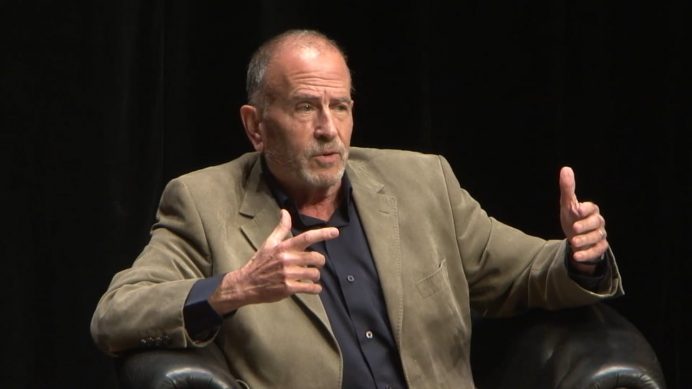In 1979, as the Mossad’s chief Iran analyst, Yossi Alpher discussed with the head of Mossad a request from Shapour Bakhtiar, who briefly ruled Iran between the Shah’s departure and Ayatollah Khomeini’s takeover, to assassinate Khomeini, then still in exile in France. That request was turned down. Here Alpher examines Israeli perspectives on the politics and the ethics of the assassination of Qasem Soleimani, the Iranian Quds Force commander, at the order of US President Trump in January 2020.
Opinion in Israel is near unanimous that we are well rid of Qasem Soleimani, the Iranian Quds Force commander assassinated at the order of US President Donald Trump on 3 January. But Israel’s rationale for welcoming Soleimani’s demise is substantially different from Trump’s rationale for killing him. And diverging Israeli and American perceptions of Soleimani’s activities are relevant not tactically, as a footnote to the Soleimani story, but rather strategically, with regard to major security developments yet to come.
The assassination through Israel’s eyes
Israel perceived Soleimani as the mastermind of Iran’s drive to project power westward through Iraq and into Syria and Lebanon in the Levant. There the Quds force and its many proxies, along with Iranian missiles and drones, pose a direct security threat to Israel. This was Soleimani’s main operational file in recent years.
From Israel’s standpoint, neither Trump nor President Barack Obama before him did anything about Soleimani’s activities in the Levant. Indeed, Obama concentrated solely on the JCPOA nuclear deal and acquiesced in an active Iranian role in the Arab Middle East. He told The Atlantic’s Jeffrey Goldberg in April 2016 that the US must ‘say to our friends as well as to the Iranians that they need to find an effective way to share the neighbourhood’. Needless to say, neither Israel nor its Sunni Arab neighbours liked the idea of sharing the neighbourhood with Shiite, non-Arab, aggressive Iran. Trump went a step further, and has been reducing the US military presence in Syria and threatening to reduce it in Iraq, much to Israel’s dismay.
It is in this context – not of nuclear issues or the Iraqi Shiite mob attack last December on the US Embassy in Baghdad – that Israelis view the removal of Soleimani as a positive move. Israel Defense Forces (IDF) Chief of Staff Aviv Kochavi recently forecast a high probability of an Israel-Iran war in Syria, and possibly in Lebanon and Iraq, in 2020 – a war that could involve highly destructive Iranian missile attacks on Israel’s cities. Soleimani’s departure is likely to lower that probability at least temporarily, if only because he was a uniquely smart and charismatic strategist who will be hard to replace.
Why could the removal of a single Iranian commander have this positive effect for Israel? Not because Soleimani was the ‘second most important man in Iran’. He was not. Iran’s Revolutionary Guards, incidentally, field dozens of additional units inside Iran and beyond besides the Quds Force. And not because he was planning new attacks on US forces and interests in Iraq. There is no evidence to support this claim by US Secretary of State Mike Pompeo, although the Quds Force, like the US Army and the IDF, undoubtedly has dozens of lethal contingency plans in its files. And not because Soleimani was responsible for recent attacks on a US drone overflying the Persian Gulf and on Saudi energy assets. He almost certainly was not directly behind these Iranian operations.
Rather, Soleimani’s mission was the Iranian drive westward. In executing it, he proved to be a strategic genius. He used few Iranian soldiers, preferring instead to deploy Shiite proxy forces from as far afield as Pakistan and Afghanistan. He was adept at recruiting Shiite mercenaries from throughout the Middle East and beyond for the struggle to rescue the Assad regime in Damascus. In late January 2020, for example, Iranian forces and Afghan Shiite mercenaries, all belonging to the Quds Force, were reported fighting alongside Syrian troops against Syrian Islamist rebels in Syria’s northwestern Idlib province, bordering on Turkey.
When, in the Spring of 2015, Soleimani saw that Iranian intervention alone would not save Iran’s Syrian ally Bashar Assad, he traveled to Moscow and persuaded Russia’s President Putin to intervene (in September 2015) and share the task with Iran. That move radically altered Israel’s strategic assessment of threats to its north.
In Israeli eyes, Soleimani’s strategic goals were to establish Iranian Shiite hegemony along an ‘Axis of Resistance’ running from Iran westward through Iraq and Syria to Lebanon, and to stake out a Persian presence on the shores of the Mediterranean for the first time in some 1500 years. Most significantly from Israel’s standpoint, the Quds Force seeks the ability to pose a strategic threat on Israel’s northern borders, the objective being first, deterring Israel from attacking Iran’s nuclear weapons infrastructure and then, at some point, attacking Israel. Not incidentally, the Quds Force also poses a threat from Iraqi and Syrian territory to Sunni-ruled Jordan, whose king a few years ago coined the term ‘Shiite Crescent’ to describe Iran’s Levantine expansion.
Soleimani’s success depended on his ability to leverage Shiite Iran’s ties with Iraq’s Shiite Arab majority, Lebanon’s Shiite Arab plurality, and Syria’s Assad regime with its strong quasi-Shiite Alawite support base. The logistics of this operation require the creation of a land-bridge from Iran all the way to the Mediterranean. Activists from all three communities, incidentally, were linked prior to 1979 with Ayatollah Khomeini, then in Iraqi exile, and supported Khomeini’s toppling of the Shah of Iran. In other words, this is no alliance of convenience; it has deep religious-strategic-historical roots.
I devoted an entire chapter to Soleimani and his regional Shiite roots and links in my latest book Winners and Losers in the Arab Spring: Profiles in Chaos. Soleimani was a ‘winner’, exploiting chaos in Iraq and Syria to project Iranian power dramatically westward toward Israel and the Mediterranean. He was a highly intelligent strategic thinker who understood how to wage asymmetrical warfare.
Was Soleimani a legitimate target?
Was Soleimani a legitimate target for assassination in Israeli eyes? Almost certainly. Israel had already reportedly killed Quds Force generals in the course of its ‘Campaign Between Wars’ (Hebrew acronym: Mabam) against Iran and its proxies, including Lebanese Hezbollah, in Syria and Iraq. The idea behind Mabam is to push Iran’s forces as far from Israel’s borders as possible, thereby postponing and ultimately perhaps rendering unnecessary the next war.
Whether Soleimani was simply a terrorist, and therefore fair game, or an Iranian military figure, is an irrelevant question for Israel. Iran is effectively, directly and via transparent proxies, waging war on Israel. Iran’s political and military leaders regularly call for Israel’s destruction. Accordingly, for Israel this was not an ethical issue.
(Here it is useful to recall that early in January 1979 Israel received a unique request from Shapour Bakhtiar, who briefly ruled Iran between the Shah’s departure to exile and Ayatollah Khomeini’s return from exile and takeover of the country. Bakhtiar asked Israel to assassinate Khomeini, then still in exile in France. As the Mossad’s chief Iran analyst at the time, I found myself discussing the request with Mossad head Yitzhak Hofi, who began by saying, ‘I oppose political assassinations’, thereby implicitly posing the question of the moral legitimacy of a decision to assassinate the man who sought to depose the Shah and rule Iran. Israel did not act.)
Israel is not participating in the discussion of the legitimacy of Soleimani’s assassination. When former US Secretary of the Navy Jim Webb asked in the Washington Post, ‘How did it become acceptable to assassinate one of the top military officers of a country with whom we [the US] are not formally at war during a public visit to a third country that had no opposition to his presence?’ – the Israeli security community stepped aside and maintained a low profile. It did not even bother to offer its own fairly convincing reasons why Israel is happily rid of Soleimani, even though President Trump and Secretary of State Pompeo could have used some more convincing rationales than their allegations that the Quds Force was somehow primed to attack US forces in Iraq.
Why can Israel step aside? Israel did not assassinate Soleimani – the US did. Iran is not at war with the US but for all intents and purposes it is at war with Israel. The question of Soleimani’s presence in a welcoming Arab country is also irrelevant for Israel, which has no relations with Iraq. Even if we accept the contention that Soleimani was a political or military figure and not a terrorist, assassinating him would surely have been as legitimate for Israel as the (alleged) targeting of Iranian nuclear scientists nearly a decade ago.
Israelis are by and large pleased with Soleimani’s removal because it weakens an immediate threat to Israel from the Quds Force and its proxies, including Lebanese Hezbollah. Note that these enemy militias have generally not threatened to exact revenge from Israel since the assassination. Even Hezbollah leader Hassan Nasrallah has declared that he will now target Americans, not Israelis.
The assassination through Trump’s eyes
For the United States, Soleimani’s assassination should perhaps have been an ethical issue. The US viewed Soleimani and his Quds Force in the context of the US military presence in Iraq and Trump administration pressure on Iran regarding the nuclear issue. For a few years, American forces and Soleimani-led militias actually collaborated tacitly to defeat ISIS in Iraq. But during other periods after the 2003 US invasion of Iraq, Soleimani’s Iraqi Shiite proxy forces attacked and killed American soldiers on Iraqi soil. Nor is there any way to confirm the contention that Soleimani was killed while on a mission of détente involving Saudi Arabia and Iran—an Iraqi argument designed to award him some sort of posthumous immunity.
Last December’s Iraqi Shiite siege of the US Embassy in Iraq, which inevitably brought back traumatic memories from 40 years ago in Tehran, was clearly the trigger for President Trump’s assassination decision because he feared paying the same price President Jimmy Carter paid in 1980 over the Iran hostage crisis: becoming a one-term president.
Yet if Trump’s objective is eventually to reopen nuclear negotiations with Iran, with whom the US is not at war, killing Soleimani sends the wrong signal. After all, the escalation that led to Soleimani’s assassination actually began with Trump’s ill-advised 2018 withdrawal from the JCPOA nuclear deal. The withdrawal was followed by Trump’s non-productive (and at times counter-productive) economic boycott of Iran, as well as his inexplicable decisions not to respond to Iranian military provocations—the downing of a US drone over the Persian Gulf and the missile and drone attack on Saudi energy facilities.
In Iraq itself, Shiite opposition to Iranian influence has become more muted since Soleimani’s death, which is an effective lever for whipping up anti-American opinion and solidarity with Tehran’s troubled regime in both Iran and Iraq. This is understandably the critical prism through which many Americans and, indeed, most of the world, view the Soleimani assassination: the US ‘lost’ Iran long ago; now it may be losing Iraq as well.
Trump inexplicably avoided retaliating when Iran attacked US and Saudi military and economic assets in the Gulf. Killing Soleimani was his delayed reaction. From Israel’s standpoint this will turn out to be a regrettable act of revenge if the end result is, as Trump has long promised and Iraq has at least halfheartedly requested, that the US withdraws militarily from Iraq and Syria.
What will be the consequences of the assassination for the US regional presence?
From Israel’s perspective, Iraq’s Shiite-majority government tolerated Soleimani and the numerous pro-Iranian Shiite militias he helped organize and arm. Baghdad has been complicit in enabling the Iranian hegemonic drive westward and facilitating the threat this poses along Israel’s northern borders with Syria and Lebanon. The small (5,000-plus troops) US presence in Iraq, along with that of additional western countries, is understood as a potential damper on this Iranian strategy – with or without Soleimani.
Moreover, the US presence in Iraq also hampers renewed expansion of ISIS’s fanatic efforts in Iraq and Syria. ISIS is more a danger to Iraq than to Israel. This may help explain why Iraq’s demand that the US force leave the country appears half-hearted and why the Trump administration is brutally pushing back with threats of financial sanctions against Baghdad that can only provide Iraq with a rationale to back off.
One way or another, Israeli considerations do not appear to be prominent in the current US confrontation-cum-dialogue with Iraq. President Trump’s 2016 campaign promise to bring US troops home from Afghanistan and Iraq is likely to be an important issue during the unfolding election year. Ironically, it emerges that getting the US out of Iraq was a mission undertaken, albeit for vastly different reasons, by both Trump and the Iranian general he recently killed, Soleimani.
Ideally from the standpoint of Israel’s real strategic interests, Trump should follow up on the Soleimani assassination with a conciliatory move. Concessions regarding a return to the JCPOA nuclear deal would be smart. A conciliatory Trump move, made from a sudden position of strength, might effectively balance out the assassination and move the US-Iran relationship in a better direction for the good of all concerned. But this would require an understanding of Iraq and Iran – indeed, of the entire Middle East – that this administration does not appear to have. Further, it would require a US leader capable of thinking and projecting beyond his/her initial knee-jerk decision.
That is not likely to happen. Nor is Israel, beset by domestic political stalemate, likely to play any sort of advocacy role here. Recall that it was Israel’s Prime Minister Netanyahu who opposed the JCPOA from the start and encouraged Trump to abandon the deal in 2018. If indeed Iran, despite the impact of heavy economic sanctions, now moves forward with a military nuclear program, Trump and Netanyahu (or their successors in office) will confront the fruits of Trump’s disastrous 2018 decision, which is responsible for much of the escalation of tensions between the US and Iran in recent months.
Accordingly, we can contemplate two possible Israel-Iran conflict scenarios. One is conventional and focuses on Lebanon, Syria, possibly Iraq, and will inevitably bring about complications for Israel with the Russian presence in Syria and, worse, heavy Iranian and Hezbollah missile attacks on the Israeli heartland. The other, post-JCPOA, focuses on Iran’s nuclear program and movement towards a military-nuclear capability – this could involve the United States as well.
At least temporarily, Soleimani’s removal from the scene positively affected the first scenario – Israel versus Iran in the Levant. But it merely exacerbated the wider tensions over the nuclear issue.





































From Ladan Boroumand:
Dr. Bakhtiar never asked nor even met with Mossad Chief Iran Analyst. And the idea of eliminating Khomeini was suggested to him by a friend, he strongly rejected it, chiefly because at the time Khomeini was not yet the cruel fanatic despot we know today. And also Bakhtiar said to this friend, you want to create another martyr? So these are retrospective fantasies. I wonder if these rumors falsely connecting Bakhtiar to Israeli intelligence are not in the interest of the Islamic Republic who sees how Bakhtiar is becoming a hero in people’s mind. It is also falsely said that Bakhtiar was helped by Israelis to leave Iran. This too is a lie, Bakhtiar had very good friend among Gaulliste establishment in France, remember he had helped with the French resistance during the war, his son was a French policeman, he knew Chaban Delmas. A French passport was issued by the French government, under a false name. He let his beard grow and took an Air France flight to France in the summer of 1979. One name I heard him mention regarding who helped with his flight was Michel Poniatowski the former Minister of Interior under Giscard d’Estaing. Remember Bakhtiar stayed in our house in Paris for a year and it was in our house that he was attacked by the terrorist Anis Naqash who missed him but killed a policeman and Bakhtiar’s neighbor. So I know what I am talking about. And really would a prime minister who just closed Israel interest section in Tehran and stopped selling oil to South Africa, would chit chat with Israeli Mossad analyst and ask him to kill Khomeini?